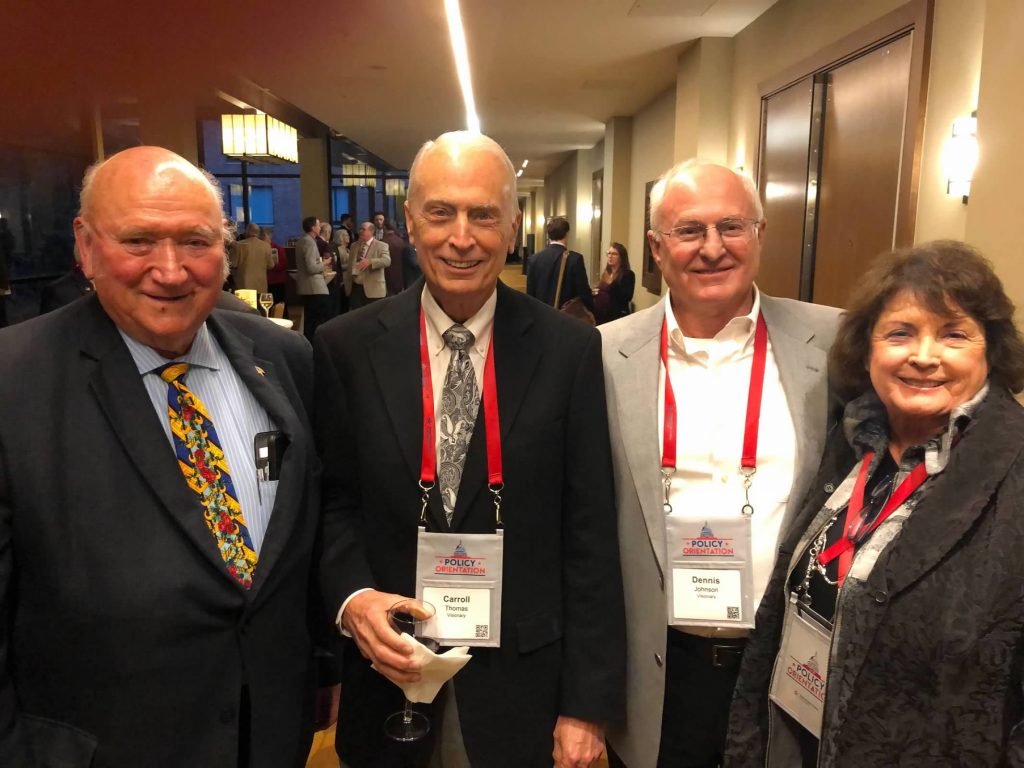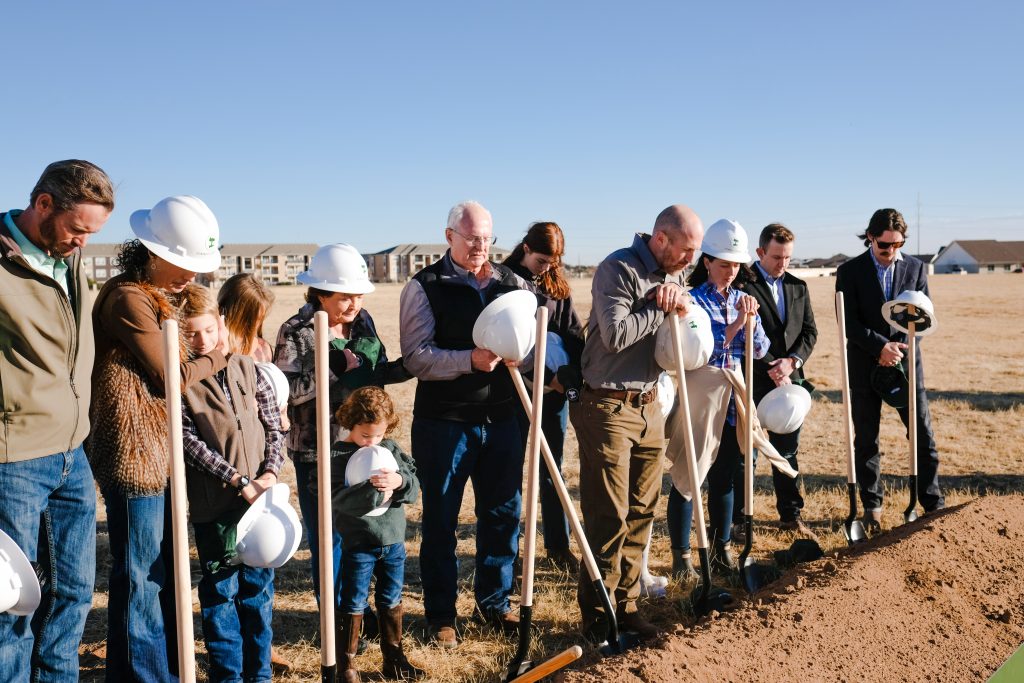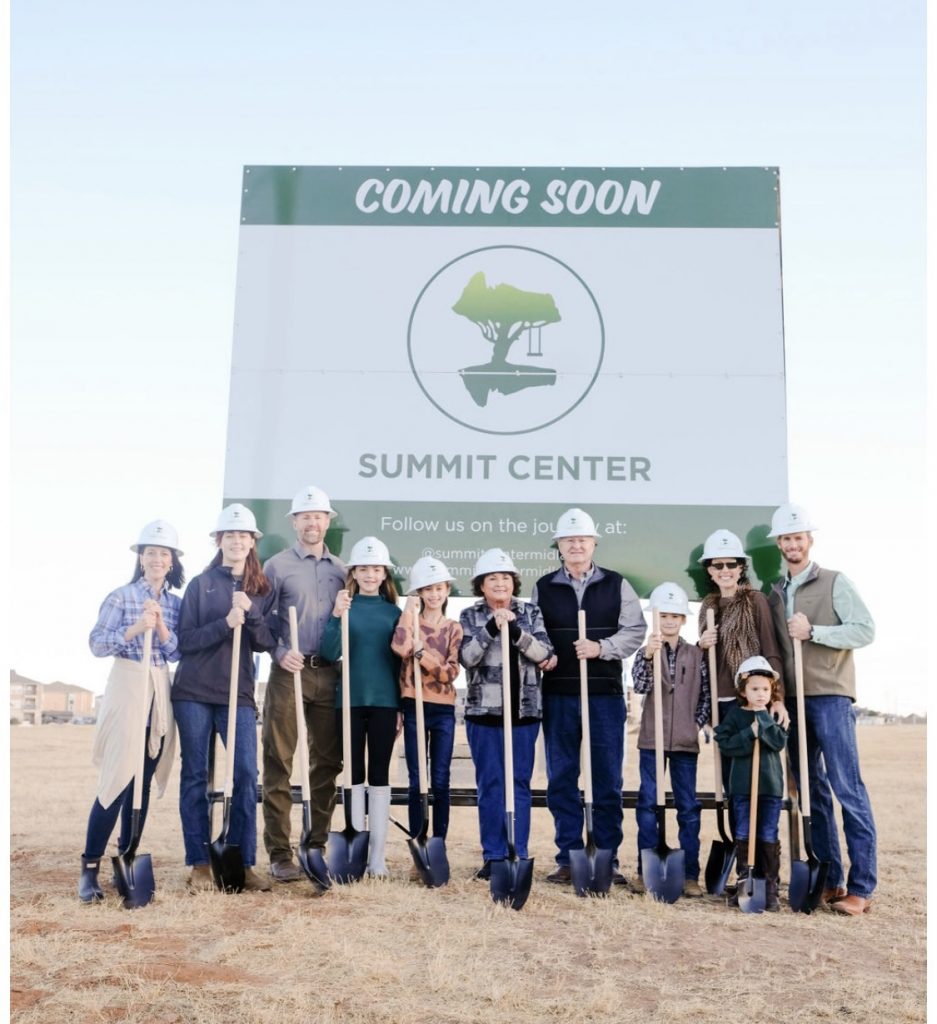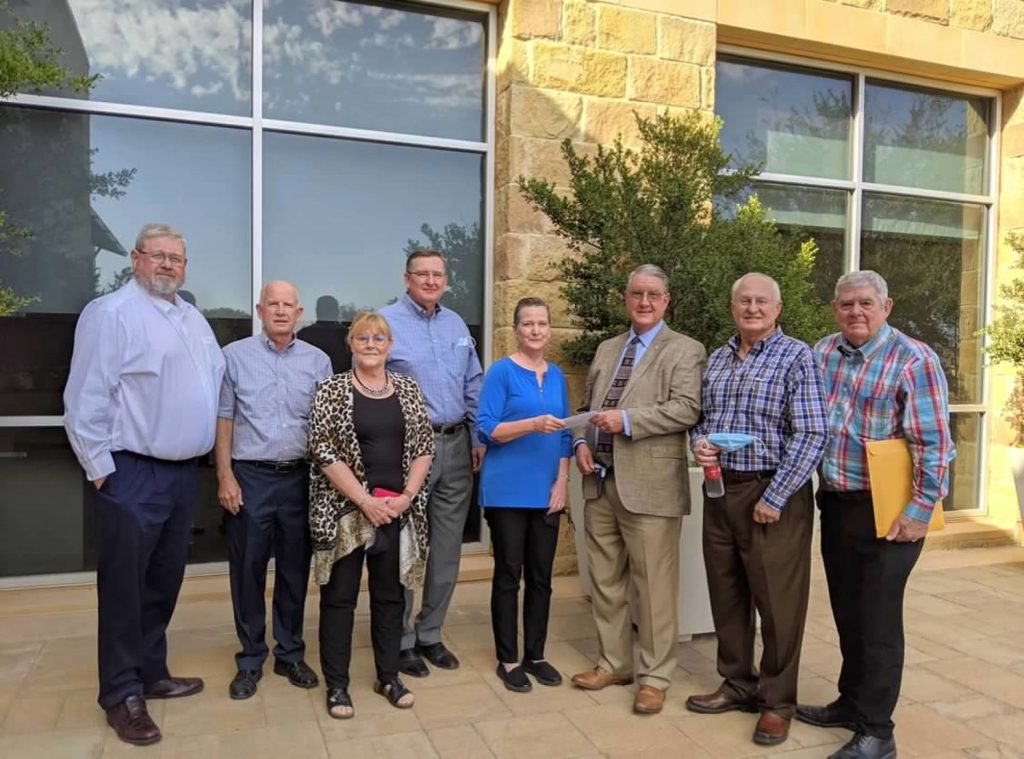The oilfield legacy of this year’s Permian Basin Petroleum Association Top Hand, Dennis Johnson, looms wide and, as with any oil legacy, deep into the earth. He will be presented the award the evening of January 18 at Midland’s Petroleum Club.
Currently Chairman and CEO of Summit Petroleum LLC, he previously had the vision to grow Henry Petroleum—presided over by his brother-in-law, the late Jim Henry—from a smalltime Spraberry producer to one of the top Permian independents by developing the Wolfcamp in 2003. He founded Summit Petroleum with son Matt in 2007 and oversaw planning and development of the family’s recently completed Summit Center, a 20 acre office/retail/park complex in north Midland.
Other business achievements include being the founder and CEO of a number of family-owned companies involved in oil, ranching, real estate, and banking.
In the community, he is currently active and serving in advisory capacities on organizations such as First Baptist Church, Midland and First Liberty Institute, Dallas. In the past, he has served in similar capacities for Manor Park, the Permian Basin Petroleum Museum, Texas A&M Petroleum Industry Board, the Fellowship of Christian Athletes, and others.
Summit runs two-to-three drilling rigs and has a capital budget of about $250 million. Its January 2025 production is approximately 28,000 BOEPD.
It is in view of that pedigree that Dennis Johnson is honored as the Permian Basin Petroleum Association’s 2025 Top Hand.
For his part, Johnson finds the kudos “flattering and humbling.” He adds, “I just want to thank the PBPA for the good work that they do and the support that they give to our industry.”
With all his oilfield achievements, Johnson is quick to list his most significant ones as personal and spiritual. First is becoming a Christian. Next is, “Being decisive: [I] met [wife] Laquita in February, proposed in April, and married in August and have now been married 53 years.” They later teamed up to teach classes on Engagement Enrichment to engaged couples and Marriage 101 to newlyweds at First Baptist Church.
Professionally, his achievement of “recognizing the potential of the Wolfcamp when added to the Spraberry zones and when hydraulically fractured with a high-rate, low-viscosity frac fluid [aka Wolfberry completions],” is also a favorite. That boosted Henry Petroleum from about 40 employees to more than 100 and increased its rig count from two to ten in just two years.
Starting at Sundown
He grew up in Sundown, Texas, in an oilfield family—his father was a salesman for Johnson Supply Corporation, which sold drill pipe, tubing, and fittings, among others. One of his first jobs in high school was in the oil patch. For several years, he recalls, the family lived above the shop. But the younger Johnson began his professional planning with some non-oil ideas.
Dentistry was one of them. That also involves drilling, but it required being inside all the time and set-in-stone office hours—not for him.
He also considered psychology, but his college course focused only on numbers, not humans. Teaching marriage classes at FBC Midland in later years was one way he fulfilled that desire to help people.
Numbers being more useful for oil than psychology, Johnson instead got a Bachelor of Science in petroleum engineering from Texas A&M.
Next, stints at Exxon and Union Texas Petroleum (UTP) saw him fill such roles as production and drilling engineer, district engineer, and operations manager, among others.
The Family Connection
With UTP, Johnson worked first in Midland, then in Houston, then back in Midland around 1980. During those oil boom times, “Some independents were starting to offer overrides or O&G participation to management positions.” Desiring to keep his growing family in Midland (son Matt was two years old) and seeing opportunities to more directly participate in the profits he was generating for companies, he began to look around.
After collecting some offers, Johnson decided to run them by Jim Henry. Jim’s advice? Come to work at Henry Petroleum.
It was the right decision, Johnson said. The men’s shared values of God, family, and business made it a perfect fit. He recalled that they worked hard on the job, then made sure to leave that at the office when they headed home to family.
While with Henry, Johnson’s creativity expanded the company’s business opportunities in several ways, some of which are as follows. Some opportunities worked better than others, but the successes were hugely significant.
Selling Gas to Power
At one point the company was running short of new drilling options and ways to keep everyone occupied. Infill drilling and waterfloods had maxed out current production, “So I started looking at opportunities outside our normal counties.” As Johnson perused the landscape, a Houston friend with a coalbed methane property in the Four Corners region offered a bid package.
It was a great opportunity, but Henry Petroleum lacked the funding to buy it alone. Therefore, “I had to also find a deep-pocket partner that would want the gas, was not the operator, and would want Henry to manage and develop the property for them.”
In the process, Johnson befriended a law firm and a gas contracting consultant working with California utilities in securing short-term gas delivery contracts. Johnson, along with Ronnie Scott—who, during Johnson’s time, was first production manager then vice president of engineering, operations, and drilling—assembled the natural gas numbers and valuations, and made a presentation to the California utility’s board of directors.
How it played out, and the humor in a related trip to Mexico, are covered later in this story.
Major and Independent Partnering
Another leap forward was Johnson’s idea to create an arrangement he called “major and independent partnering” or MIP (pronounced as a single syllable). For that, he drew on his experience at the majors.
“I had worked for Exxon and knew a lot about several of their fields. I knew that when a major oil company (MOC) sells a property they often later have seller’s regret. This happens when a new buyer ends up adding a very large uptick in value through additional study and investment,” Johnson recalled. Instead, he wondered what would happen if the independent did the research and investment while keeping the major as a partner.
Brainstorming with a friend who was still at Exxon, they identified several fields whose additional potential was too small to merit Exxon’s further investment but might pay off for an independent if the latter did not have to make a purchase. From there, “We fully developed the concept with a detailed trade structure that would work for both companies.”
In a gut-wrenching turn, Johnson’s friend was transferred within the company and “about a year’s worth of work got put on the shelf,” never to see the light of day at Exxon.
But the idea’s value was clear, and he later made MIP deals with Mobil, Texaco, Chevron, Phillips, and ARCO.
The Pearl of Great Price—a “Massive Land Grab”
Many, including longtime associate Greg Berkhouse, see the Wolfberry entry as Johnson’s crowning achievement. Berkhouse spent more than 35 years in the industry as a geologist and engineer, many of those at Henry Petroleum, where he observed and participated in the innovations Johnson brought. In 2021 Berkhouse, at Henry’s request, completed a book entitled The Wolfberry Chronicle, And Other Permian Basin Tales from the Henry Oil Company.
 Of Johnson’s legacy, Berkhouse agrees that it is extensive, and he sees the Wolfberry as its pinnacle.
Of Johnson’s legacy, Berkhouse agrees that it is extensive, and he sees the Wolfberry as its pinnacle.
“In my opinion, the greatest clip on Dennis’s highlight reel was when he approved the recommendation to pursue the Wolfberry play at Henry.” That was the moment, Berkhouse says, “when he metaphorically pulled open his button-down [shirt] and revealed the big red “S” on his chest.”
How did it come about? Berkhouse recalls that Johnson’s success came from affirming the germ of an idea that came from Henry’s Business Development Manager Gary Pitts and Geological Manager Dave Feavel. Both were geologists.
In the early 2000s Spraberry drillers were pushing wells a few hundred feet into the Wolfberry and hoping to increase production and reserves by completing them together. Pitts and Feavel realized that some of those combo wells in northwestern Upton County were significantly beating the norm.
Berkhouse said, “They studied the available data and concluded the possibility of an oil play, not yet recognized by the operators, with basin-wide potential.” Showing their conclusions to Johnson, the two recommended that Henry “conduct a covert massive land grab to corner the market on the unproven, risky play.”
With the approval of both Johnson and Henry, they secured the initial leases in early 2003. When the first two wells showed significant initial production, they knew they were right “and commenced the massive land grab—the Wolfberry play was underway,” said Berkhouse.
Family, Part Deux
 Son Matt also toyed with health care, planning a pre-med major in biomedical engineering. But one year in, realizing that med school takes 12 years, the younger Johnson called dad and said, “You know, I decided to change majors.” With no parental prompting, he chose petroleum engineering.
Son Matt also toyed with health care, planning a pre-med major in biomedical engineering. But one year in, realizing that med school takes 12 years, the younger Johnson called dad and said, “You know, I decided to change majors.” With no parental prompting, he chose petroleum engineering.
Though Matt started in Houston with Anadarko, Ronnie Scott soon was recruiting him for a growing Henry Petroleum opportunity—and on the third try, Matt accepted. Proving his worth there was imperative—no son-of-the-boss privilege, Johnson recalls.
The decision to open Summit came as Matt’s wife was expecting. The men first considered waiting until after the birth, but, Johnson recalls, “he was like, let’s do it right now and get everything done [that] we can before the baby comes.”
It worked well. The elder Johnson says, “I’m just tickled to hang out with him and be a part of the successes that have blessed Summit Petroleum.”
The Summit Center
An asset sale by Summit Petroleum provided the impetus to begin the Summit Center, “a new home for the Summit Petroleum family to work and continue the business of oil and gas development,” Johnson related. In its seven buildings with workout facilities, a restaurant, a coffee shop, pickleball courts, and four acres of shady park space, it’s a way for the Summit family to give back to the community, he said. More shops are on the way.
Down Mexico Way
While working to negotiate a power co-op agreement in California in 2001, Johnson and Scott—after attending a baseball game in which Barry Bonds hit homer number 500—they popped across the border to Mexicali, Mexico. Theirs was the only car on the street.
Mexicali’s old-style streetlights, consisting of bare bulbs strung across the streets, piqued Johnson’s interest to the point that they exited the car so he could photograph them. Meanwhile, unnoticed by Johnson, Scott saw another car containing a man and wife park beside them.
His photography completed, Johnson and the local man were both terrified when Johnson flung open the door to what he thought was his car and plopped into the man’s lap. The language barrier only heightened the panic on both parts. Scott says, “I can still hear the man’s wife’s screams in my dreams.”
Scrambling out of the wrong car and into his own, Johnson was confronted by Scott, whose only comment was, “You Aggie!”
And, said Scott, they lost that co-op bid to another oil company. Between the Bonds homer and the car mishap, they can laugh about it now.
But Dennis Johnson’s massive contributions to the oil business and to his community are serious proof that he is worthy of being PBPA’s Top Hand for this year.
Paul Wiseman writes in the oil and gas sector. his email address is fittoprint414@gmail.com.














